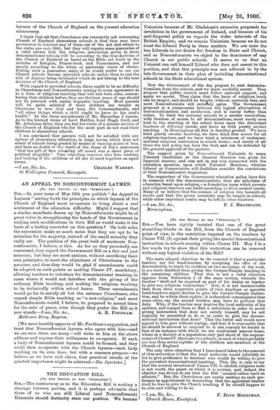[To THE EDITOR OF THE "SPECTATOR. "] SIR,—You have rightly insisted
that one of the great stumbling-blocks in the Bill, from the Church of England point of view, is the restriction imposed on the teachers by Clause VII. (1) against their giving the special denominational instruction in schools coming within Clause III. May I in a few words try to show that this restriction can be removed without any logical violation of the Bill?
The main alleged objection to its removal is that a particular teacher, say the head-teacher, by accepting the offer of the denomination to teach its children on two mornings of the week, is pro taut° disabled from giving the Cowper-Temple teaching to the remaining children. That this is not a valid objection appears from Subsection 2 of the same section, whereby the teacher "shall not be required as part of his duties as teacher to give any religious instruction." Now, it is not inconceivable that from their respective points of view Anglican or agnostic head-teachers might decline to give the Cowper-Temple instruc- tion, and be within their rights; it is therefore contemplated that some other, say the second teacher, may have to perform that duty. Why, if the teacher may deprive the local authority of his services, and compel them to find a substitute in order to avoid giving instruction that does not satisfy himself, may he not logically be permitted to do so in order to give the denomi- national instruction that does P That the latter call would more appeal to him goes without saying; and that it is reasonable that he should be allowed to respond to it can scarcely be denied in face of an instance with which we are confronted nearest home, where in a district of a population only just short of the require- ments of Clause IV. there are two schools, in each of which probably not less than seven-eighths of the children are members of the Church of England.
The only other objection that I have heard taken to the removal of this restriction is that the local authority would infallibly be led to give preference to teachers who would be willing to give the prevalent denominational teaching. This, Sir, is only to say that the avowed intention of Clause VII. to abolish religious tests is not worth the paper on which it is written, and, indeed, the objector was driven to say that the Bill "seemed rather hard on atheists." But, Sir, Churchmen are surely seeking no such pre- ference in appointment by demanding that the appointed teacher shall be free to give the Church teaching if he should happen to be able and willing to do so.
Church _Muse, Irnutsford.










































 Previous page
Previous page